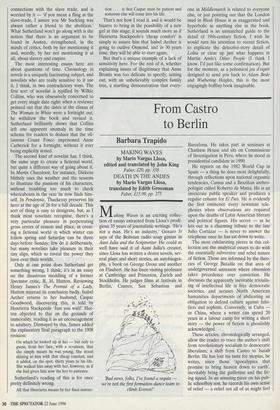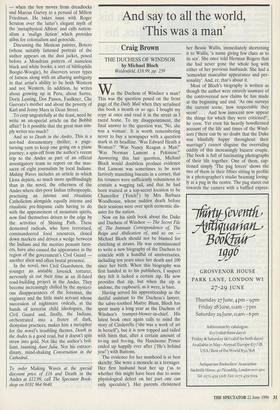From Castro to Berlin
Barbara Trapido
MAKING WAVES by Mario Vargas Llosa, edited and translated by John King Faber, £20, pp. 338 DEATH IN THE ANDES by Mario Vargas Llosa, translated by Edith Grossman Faber, £15.99, pp. 275 Making Waves is an exciting collec- tion of essays extracted from Llosa's prodi- gious 35 years of journalistic writings. 'He's not a man. He's an industry,' Genaro Jr says of the Bolivian radio soap genius in Aunt Julia and the Scriptwriter. He could as well have said it of Aunt Julia's creator, since Llosa has written a dozen novels, sev- eral plays and short stories, an autobiogra- phy, a book on George Grosz and another on Flaubert. He has been visiting professor at Cambridge and Princeton, Zurich and Stockholm. He judges films at festivals in Berlin, Cannes, San Sebastian and `Bad news, folks, I've found a sequin - we're not the first formation dance team to climb Everest!' Barcelona. He takes part in seminars at Chatham House and sits on Commissions of Investigation in Peru, where he stood as presidential candidate in 1990.
He reports on the 1982 World Cup in Spain — a thing he does most delightfully, through reflections upon national orgasmic tendencies, Camus and a Brazilian anthro- pologist called Roberto da Matta. He is an inveterate public speaker and produces a regular column for El Pais. He is evidently the first eminence every newsman tele- phones when observations are required upon the deaths of Latin American literary and political figures. His secret — as he lets out in a charming tribute to the late Julio Cortazar — is never to answer the telephone once he has sat down to write.
The most exhilarating pieces in this col- lection are the analytical essays to do with the essentially subversive and rebel nature of fiction. These are informed by the theo- ries of George Bataille on that area of undergoverned unreason where obsession takes precedence over conviction. He discusses the apparently inevitable trivialis- ing of intellectual life in free democratic societies, and accuses North American humanities departments of abdicating an obligation to defend culture against falsi- fiers and sophists. Conversely, in Cuba or China, where a writer can spend 20 years in a labour camp for writing a short story — the power of fiction is ghoulishly acknowledged.
These articles, chronologically arranged, allow the reader to trace the author's shift from revolutionary socialism to democratic liberalism; a shift from Castro to Isaiah Berlin. He has lost his taste for utopias, he writes, since those 'apocalypses that promise to bring heaven down to earth', inevitably bring the guillotine and the fir- ing squad. In an amusing piece on his pub- lic schoolboy son, he records his own sense of relief — a relief not all of us might feel — when the boy moves from dreadlocks and Marcus Garvey to a perusal of Milton Friedman. He takes issue with Roger Scruton over the latter's elegant myth of the 'metaphysical Albion' and calls nation- alism a 'malign fiction' which provides alibis for colonialism and genocide.
Discussing the Mexican painter, Botero (whose suitably fattened portrait of the author appears on the dust jacket, posed before a Mondrian pattern of nameless black and white books; a sort of bibliophile Boogie-Woogie), he discovers seven types of fatness along with an alluring ambiguity in that artist's ability to be both Western and not Western. In addition, he writes about growing up in Peru, about Sartre, Doris Lessing, Dos Passos, Faulkner, Che Guevara's mother and about the poverty of Karl and Jenny Marx in Dean Street.
To carp ungratefully at the feast, need he write an un-special article on the Bobbit affair? Is it possible that the great man sim- ply writes too much?
And so to Death in the Andes. This is a not-bad documentary thriller; a page- turning yarn to keep one going on a plane journey; a spin-off from the author's recent trip to the Andes as part of an official investigatory team to report on the mas- sacre of eight journalists by local Indians. Making Waves includes an article in which Llosa depicts, so much more spellbindingly than in the novel, the otherness of the Andes where dirt-poor Indian tribespeople, practising an intense and ritualistic Catholicism alongside equally intense and ritualistic pre-hispanic cults having to do with the appeasement of mountain spirits, now find themselves driven to the edge by the activities of Shining Path. These demented radicals, who have terrorised, commandeered food resources, closed down markets and driven a wedge between the Indians and the mestizo peasant farm- ers, have also caused the appearance in the region of the government's Civil Guard another alien and often brutal presence.
In the novel, two Civil Guardsmen, the younger an amiable lovesick torturer, nervously sit out their time at an ill-fated road-building project in the Andes. They become increasingly chilled by the mysteri- ous disappearances of the foreman, the engineer and the little mute servant whose succession of nightmare ordeals, at the hands of terrorist child ideologues, the Civil Guard and, finally, the Indians, orchestrated into a frenzy of dark, dionysian practices, makes him a metaphor for the novel's troubling themes. Death in the Andes is a good read, but it doesn't spin straw into gold. Not like the author's bril- liant, taunting Aunt Julia. Nor his extraor- dinary, mind-shaking Conversation in the Cathedral.
To order Making Waves at the special discount price of £16 and Death in the Andes at £12.99,' call The Spectator Book- shop on 0181 964 9640.



























































 Previous page
Previous page